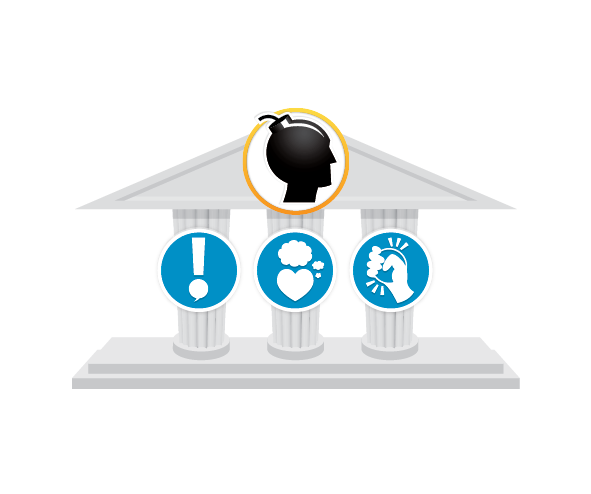Anger management is the process of learning to recognize signs that you are becoming angry, and taking action to calm down and deal with the situation in a positive and healthy way. These three pillars form the basis of anger management—assertion, empathy and stress management.

Let’s take a closer look.
Pillar # 1 Assertion
Assertion is a positive communication style which allows you to forcefully communicate a strong belief or idea. It is the ability to express feelings of anger and anxiety constructively in relationship with self and others. Communicating assertively requires that you keep in mind your rights as well as the rights of others to whom you are speaking. You have the right to say what you think and feel about a situation, while at the same time respecting the rights of others to disagree with you. How something is said is just as important as the words that are used to send your message.
Assertive communication is based on reflective thinking and a consideration for the personal rights of both self and others. Assertive communication is powerful and respectful. In order to learn to control your feelings of anger and fear, you need to identify your feelings of anger and fear and express them honestly, directly and appropriately. Anger and anxiety management are emotional intelligence skills that contribute to assertive communication.
Pillar # 2 Empathy
Empathy is the ability to understand and share the feelings of others. It is the learned ability to accurately understand and constructively respond to the expressed feelings, thoughts, behaviors, and needs of others. Accurate empathy involves active listening in a nonjudgmental manner and communicating back to the other person the feelings of being heard, understood, and accepted as a person.
Empathy is a primary characteristic of a skilled communicator. It involves actively listening in a patient, compassionate, and nonjudgmental manner and communicating back to the speaker that he or she has been heard, understood, and accepted as a person. Empathy allows you to be viewed as caring, genuine, and trustworthy. It is an essential emotional skill for developing and maintaining positive relationships with others.
Empathy is also an important tool in the management of anger because it inhibits your aggressive behaviors due to the understanding of other’s thoughts and feelings that empathy brings to the relationship process. When you understand how others might think and feel about their aggressive behaviors, it acts as a lens for seeing the negative effects of that behavior as well as a censor for that behavior.
Pillar # 3 Stress Management
Stress management is the learned ability and skill to choose and exercise healthy self-control and self-management in response to stressful events. Stress management reflects your perceived skill in managing stress and anxiety. Stress management involves self-regulation of emotional intensity and the use of cognitively-derived coping strategies in difficult and high stress situations.
Anger that results in violence is usually triggered by a stressful event that is not appropriately managed. People with skills in managing stress positively are competent managers of time and are flexible, self-assured, stable, and self-reliant.
There you have it—the three pillars of anger management. When you learn these three pillars you are well on your way to managing your stress and anxiety and, as a result, developing healthy relationships. Select the button below to learn more!
